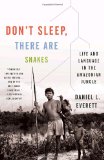Summary | Excerpt | Reviews | Beyond the Book | Read-Alikes | Genres & Themes | Author Bio

Life and Language in the Amazonian Jungle
by Daniel L. EverettThis article relates to Don't Sleep, There Are Snakes
In Don't Sleep, There are Snakes, the elephant in the room—or rather, the elephant in the Amazonian jungle—is the noted American linguist, Noam Chomsky. To put it far too simply, Chomsky and Everett are feuding over which has supremacy in linguistics: genetics or culture, nature or nurture.
Chomsky's theory of universal grammar, which has dominated linguistics for
the last forty decades, hypothesizes that the human brain comes pre-equipped
with a set of rules for constraining language. The theory arose from a question:
how can a child who is acquiring language learn what is ungrammatical, if the
only speech she hears is grammatical and correct? Adults do not teach language
to children by speaking improper sentences and then marking them as such, so how
do children know what formulations violate their languages' grammar? The theory
of universal grammar answers that this knowledge has been evolutionarily mapped
onto our brains. It is as if the rules governing the movement of chess pieces
were implanted in the human brain, so that children grow up only seeing
allowable moves when they look at the board. Because this "language instinct"
is genetic, Chomsky further hypothesizes that all of the world's languages share
an underlying structure, despite their dizzying variations in the way meaning is
expressed.
In a 2002 article in the journal Science, Chomsky, Marc D. Hauser, and
W. Tecumseh Fitch took this theory one step further by pinpointing a specific
feature of this universal grammar which distinguishes human communication from
that of other animals. After reviewing the studies done on dolphins, songbirds,
apes, and monkeys, they state, "It seems relatively clear, after nearly a
century of intensive research on animal communication, that no species other
than humans has a comparable capacity to recombine meaningful units into an
unlimited variety of larger structures, each differing systemically in meaning."
Human language owes its capacity for infinite expression to the property of
recursion, in which meaning can be embedded with meaning. Chomsky explains,
"There is no longest sentence (any candidate sentence can be trumped by, for
example, embedding it in ‘Mary thinks that…'), and there is no non-arbitrary upper bound to sentence length. In these respects, language is directly
analogous to the natural numbers." Chomsky calls this "discrete infinity" or
"infinite generativity," but a layperson would call it creativity.
Everett has sent a flare across the sky of Chomsky's kingdom with his
announcement that the Pirahãs entirely lack recursion in their language. He
discovered that a sentence with a relative clause (such as: The man who was tall
came into the house) is unavailable in their grammar and can only be expressed
in two simple sentences (The man came into the house. He was tall). But one day,
as he watched a Pirahã man making an arrow for his fishing spear, he heard
something which electrified him. The man said, "Hey Paitá, bring back some
nails. Dan bought those very nails. They are the same." These three sentences
could be translated into English as, "Bring back the nails that Dan bought."
Everett realized that the third sentence acted as a kind of equal sign to
indicate to the listener that the nails in the first sentence were the same as
the nails in the second sentence.
The implications of this tiny third sentence are incredibly far-reaching. It
indicates that the Pirahãs can say everything an English speaker can say, but
without recursion. Therefore recursion is not the fundamental characteristic of
human speech. And therefore, Everett writes, "There does not have to be a
specific genetic capacity for grammar; the biological basis of grammar could
also be the basis of gourmet cooking, of mathematical reasoning, and of medical
advances. In other words, it could just be human reasoning."
For an encapsulated version of Don't Sleep, There are Snakes, try John
Colapinto's
feature story on Daniel Everett in the New Yorker. To hear
samples of Pirahã speech and browse a few pictures of the people, visit the
author's website.
Filed under Cultural Curiosities
![]() This "beyond the book article" relates to Don't Sleep, There Are Snakes. It originally ran in January 2009 and has been updated for the
November 2009 paperback edition.
Go to magazine.
This "beyond the book article" relates to Don't Sleep, There Are Snakes. It originally ran in January 2009 and has been updated for the
November 2009 paperback edition.
Go to magazine.




Harvard is the storehouse of knowledge because the freshmen bring so much in and the graduates take so little out.
Click Here to find out who said this, as well as discovering other famous literary quotes!
Your guide toexceptional books
BookBrowse seeks out and recommends the best in contemporary fiction and nonfiction—books that not only engage and entertain but also deepen our understanding of ourselves and the world around us.